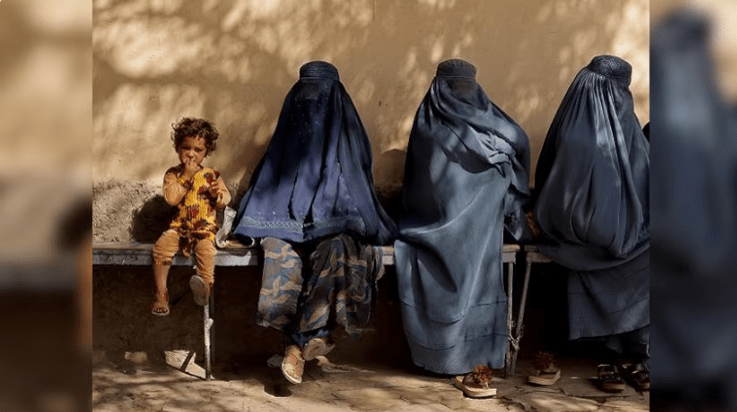
Afghan women arrested under the Taliban’s controversial new anti-begging laws have shared horrific accounts of sexual abuse, physical violence, and forced labor while in detention. Several women, all desperate to feed their children, spoke to The Guardian about their suffering under the Taliban’s crackdown, describing conditions of extreme brutality and neglect in the country’s prisons.
Since the Taliban’s return to power in August 2021, Afghan women have been banned from most forms of paid work, pushing many, particularly those in female-headed households, into extreme poverty. Faced with the inability to provide for their children, these women resorted to begging in the streets — a crime under the Taliban’s newly implemented laws.
In May 2024, the Taliban introduced a sweeping anti-begging law that prohibits “healthy” individuals from begging if they possess enough money to buy a day’s worth of food. A commission was set up to categorise beggars, registering them under the labels “professional,” “destitute,” or “organised,” and collecting their biometric data and fingerprints. According to Taliban officials, nearly 60,000 beggars were rounded up in Kabul alone.
Zahra*, a 32-year-old widow with three children, was one of those detained under the new law. Zahra’s husband, a member of the former Afghan national army, disappeared when the Taliban seized power. Desperate to feed her children, Zahra said she was forced to beg on the streets of Kabul.
“I went to the neighbourhood councillor and told him I was a widow, asking for help to feed my three kids,” Zahra recalled. “He said there was no help and told me to sit by the bakery [and] maybe someone would give me something.” Unaware of the new anti-begging law, Zahra continued to beg until she was arrested by Taliban officers.
“A Taliban car stopped near the bakery. They took my son by force and told me to get in the vehicle,” Zahra explained. Zahra claims she was held in a Taliban prison for three days and nights, where she was forced to cook, clean, and do laundry for the male detainees. She was later subjected to physical abuse when she resisted having her biometric data recorded. “When I resisted, they beat me until I was unconscious,” Zahra said, before describing a brutal assault. “I was then raped.”
Zahra’s trauma did not end with her release. “Since being released, I’ve thought about ending my life several times, but my children hold me back,” she said, explaining her feelings of isolation and helplessness. “I wondered who would feed them if I weren’t here. Who can I complain to? No one will care, and I’m afraid they’d arrest me again if I spoke up. For my life and my children’s safety, I can’t say anything.”
Another woman, Parwana*, was detained in October while begging on the streets of Kabul with her four-year-old daughter after her husband abandoned them. Parwana was taken to Badam Bagh prison, where she was held for 15 days. She described the harsh conditions, saying, “They brought in everyone, even young children who polished shoes on the streets.” Women were often subjected to humiliation and abuse. “They’d tell us women, ‘Why don’t you get married?’ beat us, and make us clean and wash dishes.”
Parwana also described being raped while in detention, along with two other women. “The attack left me traumatised and depressed,” she said. “I don’t know how I’ll ever heal from it.”
In addition to sexual violence, former detainees have reported witnessing the abuse and deaths of children in prison. A woman speaking to Afghan news outlet Zan Times claimed that two children were beaten to death while she was detained. “No one dared speak,” she said. “If we spoke up, they’d beat us and call us shameless. Watching those children die before my eyes is something I’ll never forget.”
Under the new anti-begging laws, detainees are entitled to financial assistance upon their release if they are classified as “destitute.” However, none of the women who shared their stories reported receiving any aid.
Parwana, fearful of being arrested again, no longer dares to beg for food. Instead, she relies on her neighbors for handouts. “These days, I go door to door in my neighbourhood, collecting stale, dry bread. I have no other choice,” she said. “The Taliban are brutal and oppressive, but where can I go to complain about them? We are alone.”






